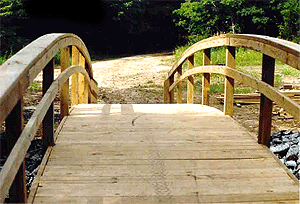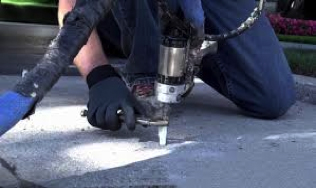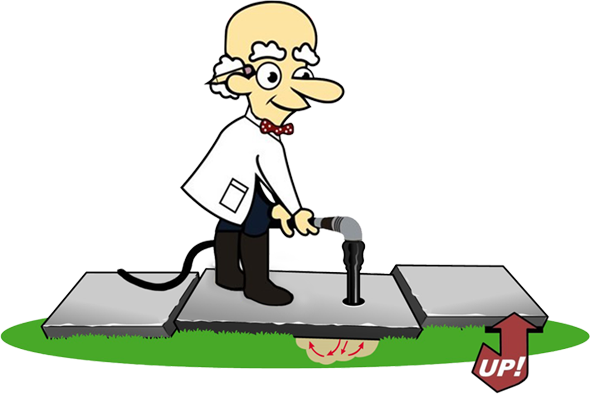Bridgewater, NJ. – Concrete Repair and Lifting Services
Bridgewater is a great town and a nice place to live. The Bridge pictured is undoubtedly coincidental to the name of the town, as it was built long after the town was named. The bridge is the entry to the Middlebrook Trail, a natural site that is home to many fantastic plants and animals.

The winter of 2017-2018 was cold in Bridgewater, New Jersey, as winters in that part of the country tend to be. However, this particular winter seemed to go on and on. Rain showers, that gave the impression spring was near, became thunderstorms that dropped a lot of water. Following the rainstorms came snow – blinding snowstorms that seemed out of the natural order of things. There was at least one report of “thunder snow,” which is documented (See YouTube). Residents couldn’t wait for the rain and snow to stop so spring could begin for real.
Concrete Damage from Weather?
Most families enjoy the extra space provided by homes with basements. Basements are great for home offices, recreational space for the kids, storage, guest quarters, and more. For some, however, that first spring trip to the basement to put away winter gear can offer a bad surprise when the basement is found to be flooded. Question: How did the water get in here?
Call a Concrete Repair Expert NOW
The Concrete Repair Expert will find the damage to the floor or foundation that allowed water to seep (or flow) into the basement, and will repair the problem. The solution may include mudjacking, concrete leveling or other remedy, but there will be no more leaks. It would be wise to get the area dry as soon as possible, before you are introduced to moisture’s good friend, Mold. Mold is a horror story on its own, so stop it before it invades your home.
Have the Concrete Repair Expert Check the Rest of Your Property.

He (or she) is there anyway and will probably not charge you to inspect for problems you might not have found yet. You know you checked the sidewalk from the driveway all the way to the back porch, and it looked fine to you. However, your Concrete Repair Expert calls you to a spot next to the sidewalk and shows you the gap that exists between the walkway and the ground. “What caused that hole,” you wonder out loud? Gopher? The neighbor’s dog? Lightning?
Your Concrete Repair Expert explains that the culprit is none other than Mother Nature herself. The heavy snows, persistent rains, repeated freezing and thawing have eroded the ground beneath the sidewalk. Luckily, it hasn’t collapsed yet, but you still picture Grandma walking her 200-pound St. Bernard down that sidewalk when it crumbles.
Mudjacking to the Rescue
Your new best friend (aka Concrete Repair Expert) assures you that the gap can easily be filled, restoring a strong foundation for the sidewalk. He checks the rest of the sidewalk for any similar erosion, and then leaves briefly, after suggesting you keep Grandma and her big dog inside the house for an hour or two. He returns shortly with his mudjacking equipment and concrete for the injection process.
After drilling a couple of small holes, he injects a compound made of sand, clay, cement, and grout into the ground beneath. After the existing gap between the dirt foundation and the sidewalk has been filled, your sidewalk will have the support it needs to be solid – and safe. When the mudjacking material hardens (in a couple of hours) you’ll be ready to take a nap while Grandma takes Tiny for a lovely spring stroll.
Concrete Vigilance
Most concrete, or buildings of similar material, will show some wear after a period of time – usually a long period of time. Regional weather and soil conditions have much to do with the longevity of concrete structures. In fact, the Greek Parthenon is still looking good after more than 2000 years. Sure, it’s had a few minor facelifts, but it’s still standing on its own.
Make it a habit to check routinely to see if sidewalks, driveways, foundations, and other concrete that support your home are in good condition. Take a peek at the soil that provides support for your home to check whether it is settling or otherwise degrading. If you find a possible issue, call your Concrete Repair Expert, even if you’re not sure. He will be happy to come out and have a look. Concrete issues that are caught early are much easier – and less expensive — to repair before damage occurs.


